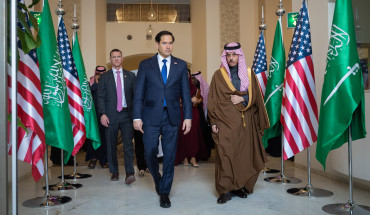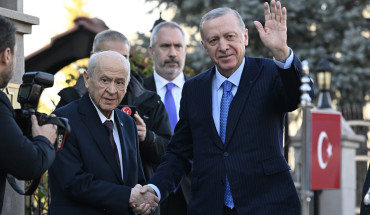The head of a prominent Iranian-backed militia group in Iraq has said that the priority of the next government in Baghdad will be to “expel the American forces from Iraq and terminate the strategic cooperation agreement between the two countries.” Qais al-Khazali, who is the leader of Asa’ib Ahl al-Haq, also predicted that a coalition of Popular Mobilization Forces (PMF) will form the next government after the upcoming parliamentary elections slated for May 12. According to Al-Arab, a UK-based Arabic outlet, Khazali had told US Secretary of State Rex Tillerson when he visited Iraq last October that the American troops “should prepare to leave from our homeland after the defeat of ISIS.” According to Al-Arab, Iraqi Prime Minister Haider al-Abadi has resisted pressure by Iranian-supported groups to set a timetable for the US exit. The report points out that Abadi has said that US forces can stay in Iraq to provide training and logistical and intelligence support to the Iraqi security forces.
Comment: With ISIS militarily defeated and Iraqi parliamentary elections just 10 weeks away, Tehran and its allies in Iraq have stepped up pressure on the Baghdad government to set a timetable for the exit of American troops that are still advising and assisting the Iraqi security forces.
In recent months, Iran’s militia allies in Iraq are increasingly threatening violence against American troops. On February 7, Kata’ib Hezbollah, an Iranian-supported PMF group, warned that its fighters will begin to militarily confront American troops “at any moment” if Washington decides to keep a long-term military footprint in Iraq. Several other Iranian-backed PMF groups have made similar threats against US troops.
In an interview with the Lebanese al-Mayadeen TV earlier this month, Jafar al-Hussaini, the spokesman for Kata’ib Hezbollah, described the American military in Iraq as an “occupation force” and called for their immediate exit. “Iraq will not see stability with America’s presence. The Americans have not entered Iraq based on the Iraqi government’s consent. Our combatants have limited weapons but a confrontation with the American forces may begin at any moment. Unlike in the past, the Americans this time will not benefit from any mediation.”
Several other Iranian-linked Iraqi groups have recently echoed similar threats against the American forces in Iraq. "The two governments should co-ordinate to ensure a full withdrawal. US presence will be cause for internal polarisation and a magnet for terrorists," said Kareem Nuri, the spokesman for the powerful Badr Organization, which has close ties with Iran’s Quds Force and controls Iraq’s Interior Ministry.
The recent escalation in anti-American statements by the IRGC and its proxies suggest that the Iranian-backed militia forces in Iraq are now focusing on undermining US interests in Iraq and are trying to speed up the US withdrawal from the country now that the Islamic State – the common enemy of Tehran and Washington at present – is defeated. Second, the IRGC may also be trying to send a message to the Trump administration that it will retaliate through its regional proxies if Washington pursues a more aggressive policy vis-à-vis Tehran.
Recently, Tehran and its allies in Iraq have also set their sight on the upcoming Iraqi parliamentary elections slated for May 12. Several prominent Iranian-backed Shiite PMF groups have formed the Fatah Alliance to compete in the elections. Hadi al-Amiri is head of the new coalition which also includes other Iranian-supported groups such as Asa’ib Ahl al-Haq and the Iraqi Hezbollah. Iraqi politicians close to Tehran have also dialed up anti-American remarks.
If Iran’s allies manage to secure a dominant position in the next Iraqi parliament, they will, as in 2011, increase pressure on the American forces to leave the country.
Asaib Ahl al-Haq – or the League of the Righteous – is an Iraqi Shiite militant group fighting in Iraq and Syria. The group is funded by the Iran and reportedly has more than 10,000 fighters. According to the U.S. government accounts, the Lebanese Hezbollah upon a request by the Iranian government helped form and train AAH in 2005 to carry out attacks against the U.S.-led coalition forces in Iraq. AAH started as a splinter group of the Mahdi Army, the powerful Shiite Iraqi paramilitary force led by Muqtada al-Sadr. AAH has been accused of killing American soldiers and committing human rights abuses against Iraqi Sunnis.
The Middle East Institute (MEI) is an independent, non-partisan, non-for-profit, educational organization. It does not engage in advocacy and its scholars’ opinions are their own. MEI welcomes financial donations, but retains sole editorial control over its work and its publications reflect only the authors’ views. For a listing of MEI donors, please click here.













